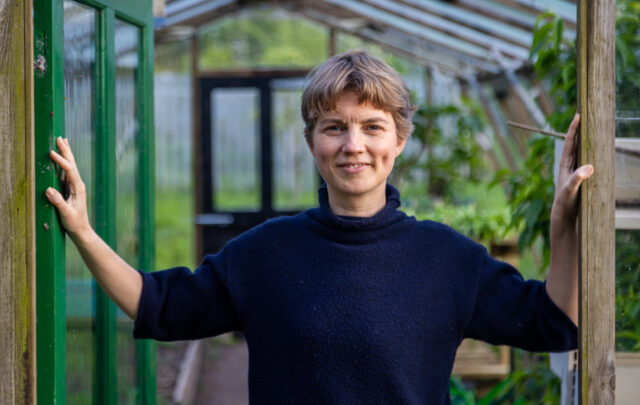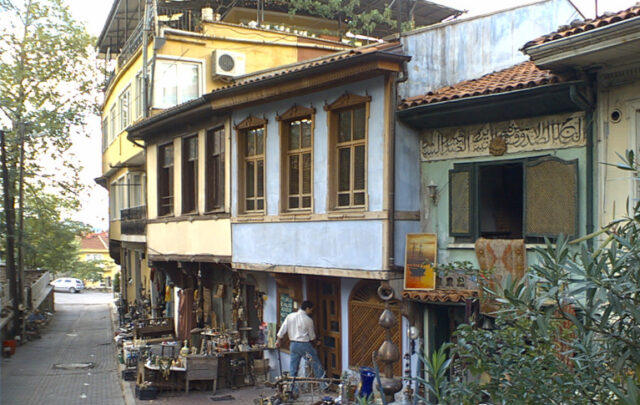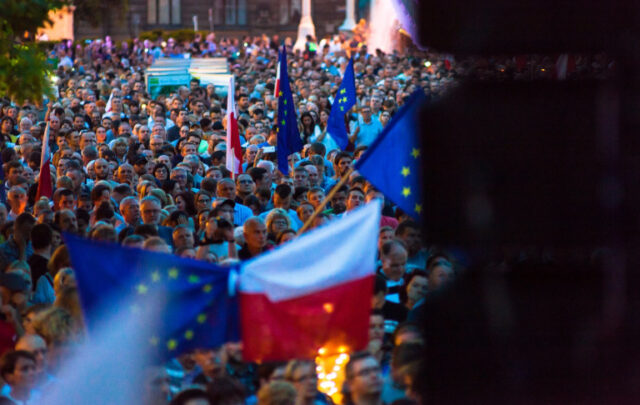Excerpt from the Worldview Dimension of Gaia Education’s online course in Design for Sustainability
“The materialistic consciousness of our culture … is the root cause of the global crisis; it is not our business ethics, our politics or even our personal lifestyles. These are symptoms of a deeper underlying problem. Our whole civilization is unsustainable. And the reason that it is unsustainable is that our value system, the consciousness with which we approach the world, is an unsustainable mode of consciousness.”— Peter Russell (Lazlo, Grof, & Russell, 1999, p.5)
Many people who have lived relatively conventional and successful lives within the Westernized industrial growth society, that has spread across the planet in the wake of economic globalization and the neoliberal “free”-market agenda, have recently woken up to a feeling of having raced at full tilt aiming for success and getting ahead, only to find out that the goals they were perusing, once reached, seemed shallow, meaningless, and forced them into a life-style or into keeping up a persona that they really felt unhappy with.
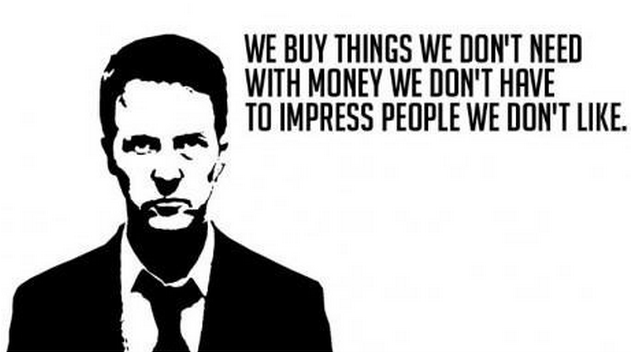 Why does this irrational behavior pattern prevail throughout the consumer society? (image)
Why does this irrational behavior pattern prevail throughout the consumer society? (image)
The last of the economic shock waves that have rippled through the global system in 2008 as a result of the so-called sub-prime mortgage lending put in question whether this experience is in fact an isolated experience of some people, or much rather, the realization that our entire society and its guiding aims has been steaming all engines ahead into an altogether undesirable direction. Both individuals and the western ‘financial success driven’ society as a whole seem to find themselves in a situation described by Joseph Campbell as “getting to the top of the ladder and finding that it stands against the wrong wall.”
“The dominant worldview of the Western industrial civilization does not serve either the collective or the individual. Its major credo is a fallacy. It promotes a way of being and a strategy of life that is ultimately ineffective, destructive, and unfulfilling. It wants us to believe that winning the competition for money, possessions, social position, power, and fame is enough to make us happy. … that is not the true.”— Stanislav Grof (Lazlo, Grof, & Russell, 1999, p.65)
Mihaly Csikszentmihalyi, professor of psychology at the University of Chicago, suggests in his book The Evolving Self (Csikszentmihalyi, 1993): “To know ourselves is the greatest achievement of our species.” He argues that in order to understand ourselves “ what we are made of, what motivates and drives us, and what goals we dream of — involves, first of all an understanding of our evolutionary past;” we need to reflect “on the network of relationships that bind us to each other and to the natural environment” (Csikszentmihalyi, 1993, p.xvii). He acknowledges the importance of the emergence of self-reflective consciousness and its role in freeing us from genetic and cultural determinism.
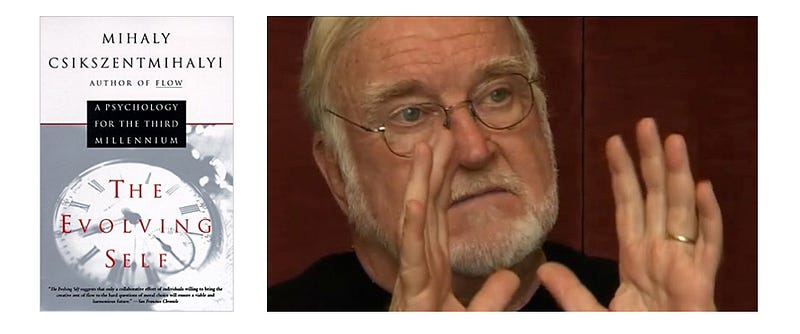 The Evolving Self by Mihaly Csikszentmihalyi suggest that commitment to conscious evolution gives people deep meaning an personal satisfaction. He is noted for his work in the study of happiness and creativity and for his notion of flow with years of research and writing on the topic. (image left; image right)
The Evolving Self by Mihaly Csikszentmihalyi suggest that commitment to conscious evolution gives people deep meaning an personal satisfaction. He is noted for his work in the study of happiness and creativity and for his notion of flow with years of research and writing on the topic. (image left; image right)
Csikszentmihalyi believes that the next big evolutionary change in human consciousness may simultaneously acknowledge the self as separate from and fundamentally interconnected with the complexity from which it emerges. The individual, its culture, and the natural environment are simultaneously differentiated from each other and united into a larger complexity.
“If it is true that at this point in history the emergence of complexity is the best ‘story’ we can tell about the past and the future, and if it is true that without it our half-formed self runs the risk of destroying the planet and our budding consciousness along with it, then how can we help to realize the potential inherent in the cosmos? When the self consciously accepts its role in the process of evolution, life acquires a transcendent meaning. Whatever happens to our individual existences, we will become one with the power that is the universe.”— Mihaly Csikszentmihalyi, 1993
Jeremey Rifkin suggest in The Empathic Civilization: The Race to Global Consciousness in a World in Crisis that human nature is fundamentally empathic rather than selfish and competitive. He reviews recent evidence from brain science and child development studies that show how selfishness, competition and aggression are not innate parts of human behaviour but learned and culturally conditioned responses.
Our very nature is far more caring, loving, and empathic than we have been educated to believe. While being empathic may have initially extended primarily to our family and tribe, our ability to empathize has continued to expand to include the whole of humanity, other species and life as a whole. Rifkin suggest that we are witnessing the evolutionary emergence of Homo empathicus:
“We are at the cusp, I believe, of an epic shift into a climax global economy and a fundamental repositioning of human life on the planet. The ‘Age of Reason’ is being eclipsed by the ‘Age of Empathy’. The most important question facing humanity is this: Can we reach global empathy in time to avoid the collapse of civilization and save the Earth?”— Jeremy Rifkin (2010, p.3)
The change that Rifkin speaks about resonates with Albert Einsteins’ conviction that our task must be to “widening our circle of compassion to embrace all living creatures and the whole of nature.” While this change is needed at a global scale of the human family, the first step lies in the awakening and transformation of consciousness of each and every one of us. This section will explore both the personal and the collective dimension of this transformation. …
 ‘The Empathic Civilisation’, by Jeremy Rifkin. In this ambitious book, bestselling social critic Jeremy Rifkin shows that the disconnect between our vision for the world and our ability to realize that vision lies in the current state of human consciousness. The very way our brains are structured disposes us to a way of feeling, thinking, and acting in the world that is no longer entirely relevant to the new environments we have created for ourselves. Do not forget to watch the beautiful video when visiting his web page and this RSA RSA animation (image left; image middle; image right)
‘The Empathic Civilisation’, by Jeremy Rifkin. In this ambitious book, bestselling social critic Jeremy Rifkin shows that the disconnect between our vision for the world and our ability to realize that vision lies in the current state of human consciousness. The very way our brains are structured disposes us to a way of feeling, thinking, and acting in the world that is no longer entirely relevant to the new environments we have created for ourselves. Do not forget to watch the beautiful video when visiting his web page and this RSA RSA animation (image left; image middle; image right)
Note: This is an excerpt from the Worldview Dimension of Gaia Education’s online course in Design for Sustainability. In 2012 I was asked to rewrite this dimension as part of a collaboration between Gaia Education and the Open University of Catalunya (UOC) and in 2016 I revised it again into this current version. You might also enjoy my book ‘Designing Regenerative Cultures’.



